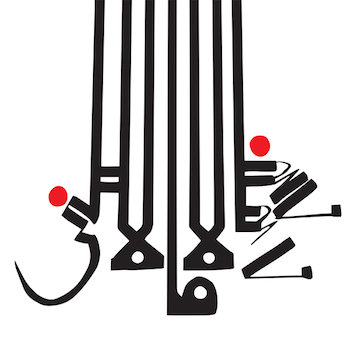It’s a cliche but it is true: hip-hop is a young man’s game. Rappers rarely age gracefully, and the most successful rappers either fade out of the game or fall off. It is the rare rapper who is able to maintain artistic relevance decades into their careers. Ishmael Butler is one of this rare breed. After being part of the successful New York jazz-rap crew Digable Planets in the 1990s, Butler released an album as Cherrywine in 2003, and then re-emerged in Seattle alongside Tendai Maraire in Shabazz Palaces. “Lese Majesty,” their second full-length, sees them continuing to develop their dense and psychedelic sound.
Butler has managed to stay relevant because he has not trying to compete with younger rappers. He’s not trying to get features from YG or 2 Chainz, he’s not teaming up with Zaytoven or DJ Mustard, and he is not trying to kick it old school over funk loops. He’s not even trying to make rap albums. He’s on some other level ish, getting cryptic, trippy, and interstellar. Shabazz Palaces’ music is heavy and weird, existing at the intersection between rap, jazz, funk, and electronic music. Butler’s lyrics are obtuse, equal parts metaphysical and revolutionary.
It’s not always easy to understand or decipher what Butler is rapping about on “Lese Majesty.” There are a lot of trippy lines that make you think that Butler and company have been on Mars in between albums. The effects his voice is often filtered through don’t make him any easier to understand.The album opens with Butler intoning, “The light hath names/Just like the heavens and the stars/Reclaim us to further along the spaceways.” They must have some good legal weed up there in Washington.
The spaciness is all well and good, but it is when Butler gets more down to earth that “Lese Majesty” really takes off. A lot of the album seems to be about Butler contemplating hip-hop and Black Americans’ history and future.”We was escaping the bleak, pursuing a feeling,” he raps on “…Down 155th in the MCM Snorkel.” “Pressure pushed them towards the instinct of brilliance/Capture then scraping the breaks off to build songs.” On “Forerunner’s Foray,” he raps:
“Crack baker super real just like ’88 was
’92 and ’92, in ’92 we grinded through
I was there, you’re a square
These do not compare”
“Motion Sickness” seems to be about a minor-league hustler recently released from prison:
“Crime related
Activated
Trap located
Strap to spray it
If you face the case
You faded
Player you’d have never made it
And although the state delayed it
And been equated
Sent you back up on the pavement
This one here is dedicated
The mistakes you’ve made
Is seasons grown
Castles raided
Fortunes blown”
Like “Black Up,” “Lese Majesty” is meant to be listened to as one piece, rather than a collections of songs. The tracks bleed into one another, and half of the 18 tracks are interludes that last less than two minutes, offering ideas of songs that fade in and out. There is a hazy, dreamy vibe to the album, all waves of sound and croaked lyrics. Occasionally it shows bursts of energy, like on “#CAKE,” but mostly it is dank and foggy. Album centerpiece “Ishmael,” for example, starts with Butler’s reverberated voice saying “mimicking gods” before he starts whisper-rapping about sinister minds and sinister motives over pulsating keyboards. It’s like the kind of dream you might have when under anesthesia, peaceful but also a little sinister. That describes the entire album.
A lot of “Lese Majesty” is funky ambient weirdness that is comforting despite being pretty strange. The album gets more dissonant in its last third. “MindGlitch Keytar ª Theme” has a driving beat with squalls of synth noise. “New Black Wave” has an off-key, off-tempo theme running through it that makes the whole song feel off and unsettling. It ends with the interstellar “Sonic MythMap for the Trip Back,” which sounds as weird as its title suggests. These dissonant sonic elements make “Lese Majesty” a somewhat challenging listen because they mess with the peaceful vibe of the album. I played “Lese Majesty” late at night several times and found that it freaked me out. It’s like a drug trip that is starting to go south on you.
“Lese Majesty” doesn’t sound like any other hip-hop albums out there, but it does have some precedents. For one thing, Shabazz Palace’s previous work has had a similar spacey feel. The album can also be seen as the spiritual successor to the Digable Planets great “Blowout Comb,” which also went for blunted-out textures rather than radio singles. D’Angelo’s “Voodoo” also came to mind while I listened to “Lese Majesty,” especially in the heavy production and sense of something worrying lurking underneath all the pretty melodies.
As a rap album, “Lese Majesty” isn’t that successful. There are no hooks or singles, and half the time you can’t understand what the hell Butler is rapping about. As a capital-A Album, however, it’s pretty great. It’s accessible enough to be listenable, challenging enough to be interesting, and has many layers for the listener to unfold and decipher. It’s an album made by people steeped in music and music history who are trying to push themselves and their listeners. It also sounds really good, which makes it an album to seek out and spend some time with.

